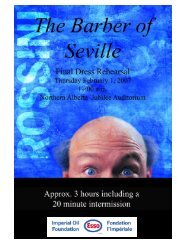Education Guide The Flying Dutchman by ... - Edmonton Opera
Education Guide The Flying Dutchman by ... - Edmonton Opera
Education Guide The Flying Dutchman by ... - Edmonton Opera
You also want an ePaper? Increase the reach of your titles
YUMPU automatically turns print PDFs into web optimized ePapers that Google loves.
<strong>The</strong> Story Behind the Story<br />
Like most great operas, <strong>The</strong> <strong>Flying</strong> <strong>Dutchman</strong> takes its story from somewhere else. In<br />
this case, many somewhere elses! If you’ve seen <strong>The</strong> Pirates of the Caribbean movies with<br />
Johnny Depp, you will have heard of the <strong>Dutchman</strong> and his cursed ship. <strong>The</strong> story is<br />
part myth, part history, part biblical parable, so what follows are only a few<br />
incarnations of a very popular story.<br />
According to folklore, the <strong>Flying</strong> <strong>Dutchman</strong> is a ghost ship that can never go home and<br />
must sail forever. Intriguingly, there is some confusion as to whether <strong>Flying</strong> <strong>Dutchman</strong> is<br />
the name of the ship or the captain. Like most legends, different tellings contradict each<br />
other and evolve over time. Here are a few early versions:<br />
• <strong>The</strong> German version names Captain Falkenburg as the <strong>Dutchman</strong>, and states that<br />
in a bet with the Devil, Falkenburg threw the dice and lost his soul, there<strong>by</strong> being<br />
condemned to sail the seas for all eternity.<br />
• In the British telling, a Dutch vessel was attempting to navigate the Cape of<br />
Good Hope when a terrible storm threatened to sink the ship. <strong>The</strong> Captain (in<br />
this case Hendrik van der Decken) refused to return to port, and apparently<br />
shouted, “May I be eternally damned if I do [return to port], though I should<br />
beat about here till the day of Judgment” (Blackwood’s Magazine May 1821), and<br />
he was cursed <strong>by</strong> the Devil to do just that.<br />
• According to still other sources, the 17 th century Dutch Captain Bernard Fokke is<br />
the model for the legendary ghost. Fokke was known for the uncannily fast trips<br />
he made from Holland to Java, and he was suspected of having made a deal with<br />
the Devil in order to achieve his quick trips.<br />
Even Wagner’s sources are muddled: in one instance he claimed to be inspired <strong>by</strong> a<br />
stormy sea voyage he took in 1839, but in his autobiography he claims to have taken the<br />
story from Heinrich Heine’s <strong>The</strong> Memoirs of Mister Schnabelewopski (or Aus den Memoiren<br />
des Herrn von Schnabelewopski). This was a multi-layered fictional memoir in which a<br />
young Polish man recalls his life in Germany and the Netherlands. In the course of the<br />
story, the young man sees a play about the <strong>Dutchman</strong>, which some scholars believe was<br />
actually Edward Fitzball’s 1826 play, <strong>The</strong> <strong>Flying</strong> <strong>Dutchman</strong>. Heine also introduces the<br />
“Mrs. <strong>Dutchman</strong>” character, whose love would save the <strong>Dutchman</strong> from his curse.<br />
<strong>Education</strong> <strong>Guide</strong><br />
<strong>The</strong> <strong>Flying</strong> <strong>Dutchman</strong><br />
<strong>by</strong> Richard Wagner<br />
17
















